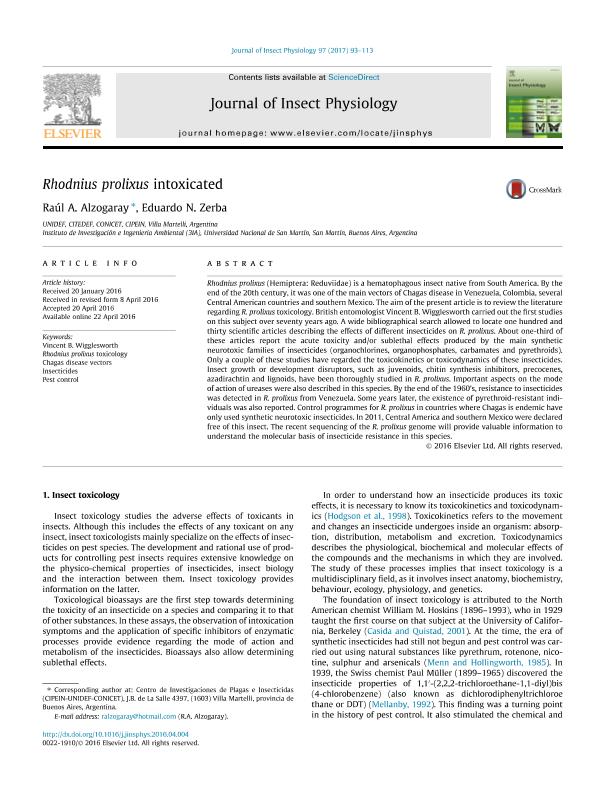Mostrar el registro sencillo del ítem
dc.contributor.author
Alzogaray, Raúl Adolfo

dc.contributor.author
Zerba, Eduardo Nicolás

dc.date.available
2018-05-04T17:42:52Z
dc.date.issued
2017-02
dc.identifier.citation
Alzogaray, Raúl Adolfo; Zerba, Eduardo Nicolás; Rhodnius prolixus intoxicated; Pergamon-Elsevier Science Ltd; Journal of Insect Physiology; 97; 2-2017; 93-113
dc.identifier.issn
0022-1910
dc.identifier.uri
http://hdl.handle.net/11336/44158
dc.description.abstract
Rhodnius prolixus (Hemiptera: Reduviidae) is a hematophagous insect native from South America. By the end of the 20th century, it was one of the main vectors of Chagas disease in Venezuela, Colombia several Central American countries and southern Mexico. The aim of the present article is to review the literature regarding R. prolixus toxicology. British entomologist Vincent B. Wigglesworth carried out the first studies on this subject over seventy years ago. A wide bibliographical search allowed to locate one hundred and thirty scientific articles describing the effects of different insecticides on R. prolixus. About one-third of these articles report the acute toxicity and/or sublethal effects produced by the main synthetic neurotoxic families of insecticides (organochlorines, organophosphates, carbamates and pyrethroids). Only a couple of these studies have regarded the toxicokinetics or toxicodynamics of these insecticides. Insect growth or development disruptors, such as juvenoids, chitin synthesis inhibitors, precocenes, azadirachtin and lignoids, have been thoroughly studied in R. prolixus. Important aspects on the mode of action of ureases were also described in this species. By the end of the 1960?s, resistance to insecticides was detected in R. prolixus from Venezuela. Some years later, the existence of pyrethroid-resistant individuals was also reported. Control programmes for R. prolixus in countries where Chagas is endemic have only used synthetic neurotoxic insecticides. In 2011, Central America and southern Mexico were declared free of this insect. The recent sequencing of the R. prolixus genome will provide valuable information to understand the molecular basis of insecticide resistance in this species.
dc.format
application/pdf
dc.language.iso
eng
dc.publisher
Pergamon-Elsevier Science Ltd

dc.rights
info:eu-repo/semantics/openAccess
dc.rights.uri
https://creativecommons.org/licenses/by-nc-sa/2.5/ar/
dc.subject
Vincent B. Wigglesworth
dc.subject
Rhodnius Prolixus Toxicology
dc.subject
Chagas Disease Vectors
dc.subject
Insecticides
dc.subject
Pest Control
dc.subject.classification
Otras Ciencias Biológicas

dc.subject.classification
Ciencias Biológicas

dc.subject.classification
CIENCIAS NATURALES Y EXACTAS

dc.title
Rhodnius prolixus intoxicated
dc.type
info:eu-repo/semantics/article
dc.type
info:ar-repo/semantics/artículo
dc.type
info:eu-repo/semantics/publishedVersion
dc.date.updated
2018-05-04T14:55:51Z
dc.journal.volume
97
dc.journal.pagination
93-113
dc.journal.pais
Estados Unidos

dc.journal.ciudad
New York
dc.description.fil
Fil: Alzogaray, Raúl Adolfo. Consejo Nacional de Investigaciones Científicas y Técnicas. Unidad de Investigación y Desarrollo Estratégico para la Defensa. Ministerio de Defensa. Unidad de Investigación y Desarrollo Estratégico para la Defensa; Argentina
dc.description.fil
Fil: Zerba, Eduardo Nicolás. Consejo Nacional de Investigaciones Científicas y Técnicas. Unidad de Investigación y Desarrollo Estratégico para la Defensa. Ministerio de Defensa. Unidad de Investigación y Desarrollo Estratégico para la Defensa; Argentina
dc.journal.title
Journal of Insect Physiology

dc.relation.alternativeid
info:eu-repo/semantics/altIdentifier/doi/http://dx.doi.org/10.1016/j.jinsphys.2016.04.004
dc.relation.alternativeid
info:eu-repo/semantics/altIdentifier/url/https://www.sciencedirect.com/science/article/pii/S0022191016300816
Archivos asociados
